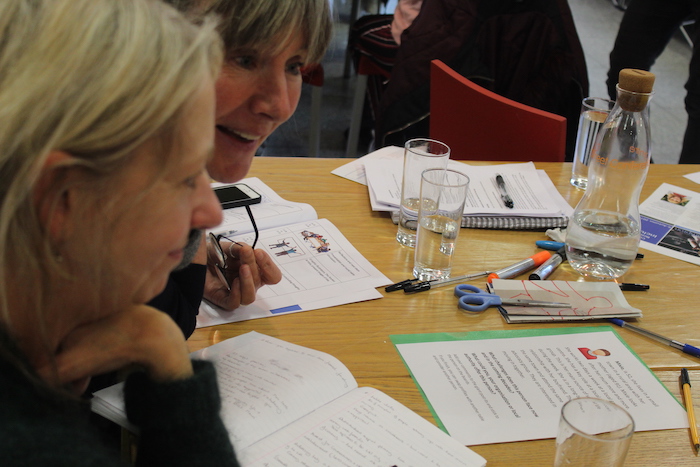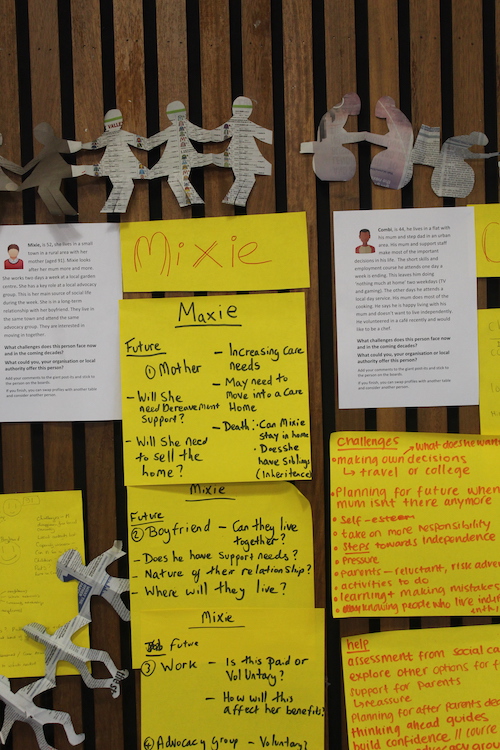Impact event round table: The role of organisations

In the afternoon of our impact event we focused on the role of organisations. Working in their table groups, our attendees were given profiles of three people with learning disabilities - Combi, Mixie and Flexi. These profiles were (as their names suggest) composites based on our research findings.
With each profile, we asked the following two questions:
- What challenges does this person face now and in the coming decades?
- What could you, your organisation or local authority offer this person?
Each table recorded and shared their responses on giant post-it notes.

The profile descriptions and all the responses are reproduced below:
Combi
Combi is 44, he lives in a flat with his mum and step dad in an urban area. His mum and support staff make most of the important decisions in his life. The short skills and employment course he attends one day a week is ending. This leaves him doing ‘nothing much at home’ two weekdays (TV and gaming). The other days he attends a local day service. His mum does most of the cooking. He says he is happy living with his mum and doesn’t want to live independently. He volunteered in a café recently and would like to be a chef.
Challenges
Making own decisions – travel or college. What does he want?
Planning for future when mum isn’t there anymore
Self-esteem
Take on more responsibility
Steps towards independence
Pressure
Parents – reluctant, risk averse
Activities to do
Learning and making mistakes
Knowing people who live independently
Help
Assessment from social care
Explore other options for future support for parents (reassure)
Planning for after parents’ death
Thinking ahead guides
Build confidence course
Join self advocacy groups
Asking friends what they do
Help and support through college and other orgs.
Challenges
Who is going to make decisions when mum is not there?
Trying to learn to make own decisions
Look for courses available in cooking
Look to help with cooking at home
Challenge also for mum if son moves out, but also benefit as more free time for mum
What could we offer this person?
Signpost to organisations that can support him / courses available
Develop a programme to employment and long-term support to allow him to stay in employment
Encourage to join groups that he might be interested in
Challenges
Now
Course ending – doesn’t know what to do after that
Local day service – could be shut down. What would happen to him then?
His mum does his cooking – he needs to learn to do it himself
He wants to be a chef – needs cooking course in his area
Future
He should learn to be independent for when his mum is no longer around
How we can help Combi
Meet him
Get to know him
Share our stories
Give encouragement and tips
Invite him to events – Heart n Soul, Beautiful Octopus Club
Invite him to cooking class
Share information about services
Shared accommodation
Mixie
Mixie is 52, she lives in a small town in a rural area with her mother (aged 91). Mixie looks after her mum more and more. She works two days a week at a local garden centre. She has a key role at a local advocacy group. This is her main source of social life during the week. She is in a long-term relationship with her boyfriend. They live in the same town and attend the same advocacy group. They are interested in moving in together.
What could be offered:
Bereavement support (HFT)
Social housing
Careers assessment
Community & church centre (Salvation Army)
Luv2MeetU (HFT) friendship group
Allotments & employment (Pulp Friction)
Future
1. Mother
Will she need bereavement support?
Will she need to sell the home?
Increasing care needs
Many need to move into care home
Can Mixie stay in home?
Does he have siblings (inheritance)?
2. Boyfriend
Can they live together?
Does he have support needs?
Nature of their relationship?
Where will they live?
3. Work
Is this paid or voluntary?
How will this affect her benefits?
4. Advocacy Group
Voluntary?
We observed Mixie seems to have low support needs. The conversation moved on to thresholds & processes. As a result, we have completely dehumanised Mixie.
Challenges
Disappearing from local community
Local contracts lost
Capacity issues
Can be an LPA?
Children? Pets?
Advocacy gap
Future plans
Relationship mapping – neighbours, work, community
Future plans with partner to be explored
Money – income maximisation
Person Centred Planning – Map? Path? Hopes and dreams, What kind of life do you want?
Inheritance planning with mum
Care act assessment
Benefits check
Advocacy gap – signpost to what’s needed
Older carers network
Flexi
Flexi is 36, he was living in a residential unit but his mother was unhappy with the care he was receiving. He is now living at home. He has ‘behaviour which challenges’ and the only day service his mum can find to take him to is a 60 mile each way trip. They do this once a week so his mum has a break. They have a budget for a personal assistant, but the staff keep leaving the role. His mum reports they can’t go on like this.
Challenges
A parental dynamic – carrying on into late stages of life i.e. mum deciding what may be best
Offer
Access to advocacy for guidance on what Flexi wants to do, where Flexi wants to live etc.
Access to experienced P.A.s
Support for mum – benefits, support understanding of adult
List of services in area
Challenges
Isolation, lack of support, understanding behaviours, understanding his wants / wishes
Look at respite opps.
Age related concerns
Organisation: to check for alternative day centres or similar
A check of the service currently provided
Is there another P.A. provider available?
Are the assistants leaving because of mom?
Solutions
PA needs training / better pay!
Person centred review – what does Flexi want?
Look at what’s happening in the community
Careers assessment
Advocate for Flexi
Maybe her wants to work?
Mam is getting old – so is he





